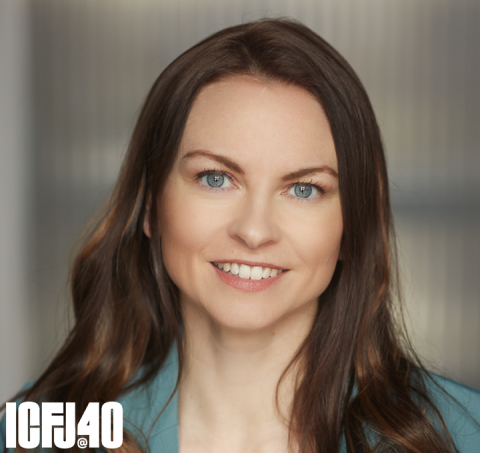The biggest public service journalism provides is “helping people understand the world and themselves,” says Jessica Buchleitner.

With financial and mentoring support from ICFJ, Buchleitner published a reported essay that does just that. The piece in Aeon examines complex issues surrounding migration, identity and belonging, stemming from her time as an American in Germany.
Buchleitner covers conflict, sexual violence, diplomacy and technology, including its impact on society. She is the author of the “50 Women” anthology series. Her writing has appeared in Nieman Storyboard, Publisher’s Weekly, L'Atelier Insights and elsewhere. She is currently working on a piece about DNA testing.
Originally from South Carolina, Buchleitner is based in San Francisco.
This interview has been edited slightly.
How have you been involved with ICFJ over the years?
I was the grateful recipient of a 2023 News Corp Media Fellowship program reporting grant to report on Ancestral Homeland Migration – the phenomenon of feeling in between belonging when migrating to a foreign country that one has ancestral ties to.
The person must undergo an assimilation process that makes them question where they truly belong and how they can belong. I was inspired to investigate this after living in Germany for almost five years. I always felt like an imposter because, by name and phenotype, I appear to be German, but I realized quickly that I had to work hard to belong by learning the language, history and culture. It felt like a purgatory-esque place to be.
I knew this had to be a more universal human experience and sought to investigate it deeper and further. It seemed to be something millions of others also grappled with but could not find comfort in migration research because it is mainly focused on diasporas, refugees or forced migration.
What was the biggest outcome from participating in the program?
After Aeon published the reported essay, I received emails and messages on various social channels from people telling me that this in-between place was something they had struggled with and that the essay helped them better define and understand what they experienced. This is one of the most powerful parts of journalism, helping people understand the world and themselves. At least I see that as the biggest public service aspect of the profession.
What is something impactful you have worked on since participating in an ICFJ program that you are proud of and would want to highlight?
Now I am finishing a longform article on privacy in DNA testing. DNA testing brought the world much information and helped countless people better understand their ancestry. It can continue to do so, as long as privacy concerns are respected with consumers.
Why is it so important right now to provide the kind of support to journalists that ICFJ does, especially in the region where you work and/or on the issues you work on?
Since the early 2000s, journalism's business model has been topsy-turvy, and funding has dried up in many ways. Longform and investigative reporting is lengthy and expensive, so every grant or contribution helps. ICFJ provides grants and training to journalists that help them evolve and give them access to report important stories that could otherwise languish.
What are you currently working on that you’re excited about?
For a new gig, I am diving back into drone usage again after taking the Poynter Institute’s Drone Journalism seminar in 2017. Drones are a fantastic tool for providing perspective to reporting, getting advanced photography shots, and reaching heights humans can't.
Why did you choose to become a journalist?
In 2007, my sole purpose was to tell women’s stories. True stories of what real, everyday women heroes evolved from. This purpose turned into an award-winning book series called “50 Women,” featuring personal narratives emphasizing strength and perseverance told by 50 different women from 30 countries.
In these individual stories that reflect cross-cultural experiences, the women discuss their unique experiences navigating and overcoming obstacles concerning political, cultural and societal issues, armed conflict, gender-based violence, immigration, health afflictions and business ventures. Since then I’ve evolved to report on emerging technology and other areas. The power of journalism is the freedom to explore broad human experiences and truths.
What’s one piece of advice you’d give to an aspiring journalist?
Journalism is about finding a red thread and then following it to see where it connects to other things. There is no right or wrong hypothesis; everything in journalism is a hypothesis until you verify it. Be ready for your assumptions to change and for the direction of your reporting to change. They often do, but that is the beauty of journalism.
Is there anything you would like to add?
Have patience. Your editor is likely overwhelmed and overstretched, your colleagues are probably wondering if they will have jobs in another year, and you won't be able to report all the stories you want to. Things emerge in their own time. I once spent two-and-a-half years reporting a story about sexual harassment in virtual reality environments because the macro environment it was nested within kept changing rapidly. It was published around the same time [Steven] Spielberg’s Ready Player One came out. This timing was very serendipitous and taught me that everything has its divine timing for when it will emerge. This can be frustrating but try to trust that your story will appear when it is most meant to.